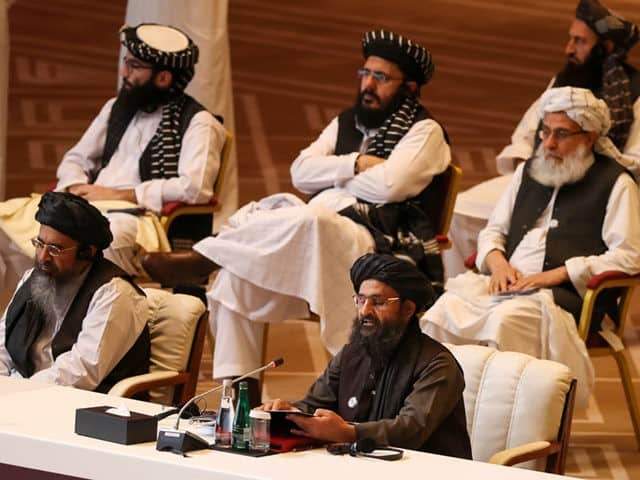Iran Hosts Taliban Leader as Afghanistan Peace Negotiations Stall

Representatives of the Taliban are currently meeting with Afghan government officials in Qatar for peace negotiations but, by all accounts, the talks have reached an impasse.
On Sunday, Iranian state media revealed the Taliban’s chief political official, Mullah Abdul Ghani Baradar, has been in Tehran for the past week, discussing Iran’s possible entry into the Afghanistan conflict as a mediator.
According to Iranian and Taliban officials quoted by Reuters, the meetings in Tehran were more productive than the ongoing negotiations in Qatar:
Iran’s Foreign Minister Mohammad Javad Zarif met Taliban political chief Mullah Abdul Ghani Baradar in Tehran, and told him that Washington was not a “good mediator” for the conflict, Iran’s Tasnim news agency reported on Sunday.Iran supports an inclusive Afghan government that would include all ethnic groups and sects, Zarif was quoted as saying. Taliban spokesman Mohammad Naeem said on Twitter that the meetings had taken place “in a good atmosphere.”“The situations in Afghanistan, Intra-Afghan negotiations, the full implementation of the Doha agreement and Afghanistan’s & region’s need (for) peace were discussed,” he added.
Khaama Press noted Sunday that Iran was cozying up to the Taliban at the same moment the United States, United Kingdom, and European Union are denouncing the Taliban’s flagrant defiance of its ceasefire promises and condemning the wave of murder, kidnapping, and vandalism sweeping the country.“The international community has invested heavily in energy, food security, water resources, and road infrastructure for the benefit of the Afghan people. We condemn the on-going destruction of vital infrastructure, including digging up roads, destroying cell towers, and blowing up energy stations by the Taliban,” the Western nations said in a joint statement.
“These actions serve no purpose besides hurting the Afghan people who — largely due to decades of conflict — suffer from food insecurity and significant economic and development challenges, further exacerbated by the ongoing pandemic,” the statement added.
“We expect the Taliban to demonstrate its support for the people of Afghanistan by ending the violence, stopping the destruction of vital infrastructure, and committing to a sustainable peace, for the benefit of all Afghans,” they said.
This was very different from what Mullah Baradar heard in Tehran. Iranian Foreign Minister Mohammad Javad Zarif insisted all of Afghanistan’s problems are due to the Western military intervention after 9/11 and the “destructive role of [the Islamic State] in Afghanistan.”
“The noble people of Afghanistan have been wronged. The war and occupation of Afghanistan have dealt heavy blows to the Afghan people,” Zarif said.
The Jerusalem Post suspected the Taliban, Iran, and other authoritarian regimes in the Middle East see the turnover of administrations in Washington as an opportunity to sideline the United States from peace negotiations, especially since they do not know if President Joe Biden will be as eager to withdraw from Afghanistan as President Donald Trump was.
“Support for the Taliban’s growing role in Afghanistan, after 20 years of US war there, has come from Iran, Russia and Qatar. It will likely come from Turkey, Pakistan, Malaysia and other countries that form part of an authoritarian, or Islamist, group that seeks to remove pro-Western governments,” the Jerusalem Post predicted, expecting Iran to run the same playbook in Afghanistan that it uses to support its terrorist proxies in Gaza, Iraq, and Yemen.
“Iran’s goal is to cultivate religious extremist groups across the region, either among Shiites or sometimes among Sunnis, including Hamas and the Taliban, and advance them to take over countries or hijack political systems. Turkey also supports this method and hosts Hamas terrorists,” the article noted.
Iran has offered to do more for the Taliban than merely tell its mullahs that all of their problems are America’s fault. In mid-January, Iran offered to send military-trained, battle-hardened Afghans recruited by Tehran to fight in Syria back home, ostensibly so they could help the Afghan government and Taliban fight their mutual adversary, ISIS.
Afghan officials were uneasy about this offer, suspecting the forces from Iran’s notorious Fatemiyoun Brigade would become a Shiite military proxy for Tehran that would be more likely to partner with the Taliban than support the internationally recognized government in Kabul. Among other unnerving details, most of Iran’s recruits from Afghanistan came from an ethnic group called the Hazaras that feels persecuted by the Afghan government.
The Taliban on Friday urged the Biden administration to stick to President Trump’s timetable for withdrawing U.S. troops from Afghanistan and threatened violence against the American forces if they do not withdraw.
Photo: KARIM JAAFAR/AFP via Getty Images
Link: Iran Hosts Taliban Leader as Afghanistan Peace Negotiations Stall (breitbart.com)











